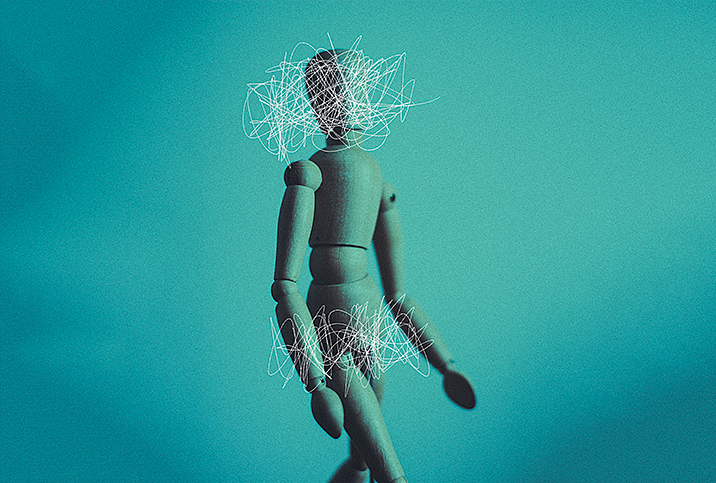Sensory Overload During Intimacy Can Be a Problem for Neurodivergent People

Editor's note: Some of the sources for this article requested their full names and locations not be used.
Since I was a child, I have had a turbulent relationship with sensory issues. Sitting around the dinner table, I would shout at my siblings for chewing too loudly, and the simple rustle of a crisp packet on public transport would be enough to cause a visceral feeling of discomfort in my chest, standing the hairs on my arms on end. To this day, I still feel the same: My triggers remain eating and rustling, and I'm further perturbed by repeated loud movements, slamming doors and the crash of pots and pans in the kitchen.
In 2021, at the age of 23, I was diagnosed with ADHD, or attention-deficit/hyperactivity disorder. Interestingly, I identified my issues with sensory overload before my diagnosis and started using the term to describe my experiences long before I even suspected I might be neurodivergent, which refers to a number of conditions characterized by atypical neurological behavior and development.
ADHD resource ADDitude defines sensory processing disorder, or SPD, as a neurological condition that makes it hard to process and act on information received from the senses. For some people with SPD, information reaching the senses feels like an assault of competing stimuli, and for others, outside stimuli are dulled, the site states. People experiencing the latter might yearn for extra stimulation. Critically, people with SPD can suffer from sensory overload or hypersensitivity, defined as the overstimulation of the senses. This can lead to discomfort, upset or even meltdown, whether internal or external.
I've been sexually active since I was 16 and I've always struggled with sensory overload in the bedroom. Stimulating an array of senses, sex is often beautifully intimate, and that's almost part of the problem. The repeated sound of a creaking bed or the incessant brush of an abrasive pillow can be distracting or even triggering. Moreover, physical intimacy, even with my long-term partner, can sometimes be overwhelming. When it gets to be too much, I switch off, at risk of ruining the moment entirely.
In my wider life, I'm well acquainted with how to combat sensory overload. If I'm able to, I take myself to a dark, quiet room and sit in silence, or I shut my eyes and count in tens until the pain dissipates. Once, in a rented flat of mine, a smoke alarm went off and it was so loud that I had to lie down for an hour. I was emotionally and physically distressed, and the only way I could untangle myself was to detach from my senses. During sex, however, these techniques aren't applicable. I can't remove myself from the room for fear of killing the buzz, and I can't sit in a dark space until the noise goes away.
My experience with sensory overload isn't unique
John, located in Wilmslow, United Kingdom, lives with obsessive-compulsive disorder (OCD). Born with a rare condition known as XXY syndrome or Klinefelter syndrome, affecting people with learning disabilities, he experiences sensory overload daily.
"It affects my daily life, whether that's during sex, at work, whilst shopping or at the gym," John said. "Loud noises and smelly places are difficult, which can make sex challenging. If someone is moaning too loudly, it just triggers me, so I stop."
Kate, from London, lives with ADHD, experiencing similarities with sensory overload disorder.
"I become so distressed by noises that are triggering for me. In the past, I've stopped having sex on a squeaky mattress because the noise has been overwhelming. Even if I'm really horny, I can't make that sacrifice. It sends me into overdrive, and I shut down completely," she said. "I'd rather not have sex than trigger or overload my senses. I've had sex on a hard floor before as an alternative because I can't stand excessive creaks or bumps in a mattress. Luckily, my partner was very accommodating, but I couldn't help but feel a bit embarrassed."
How to cope with sensory overload during intimacy
Ness Cooper, a UK-based clinical sexologist, offered some advice for people trying to manage sex and sensory processing issues.
"Using guided masturbation apps may be a way some can learn how their body responds to different sensations and self-touch," Cooper said. "If there are any particular materials you don't enjoy, make sure that any sexual devices aren't made out of these."
Cooper also touched on sensory processing techniques.
"Some sensations can be reduced by the use of blindfolds and earplugs or noise-canceling plugs," Cooper said. "Understanding that you don't have to fit into a standardized box on sexual likes and dislikes can help. It's different for each individual who is neurodivergent, and it takes time to find things that work for you.
"Finding methods to cope can help, but talking to a partner can help, too. Don't be afraid of taking breaks, and remember that even if you're unable to return to sex right there and then, it's OK to stop and try again when you feel comfortable. Never feel like you have to push through," Cooper concluded.
I'm 24 now and I've learned a lot in the eight years that I've been sexually active. Post-ADHD diagnosis, I understand my convoluted, complicated relationship with sound, and I'm still trying to navigate this fresh path that life has directed me toward.
At present, the most effective coping mechanism I've developed for experiencing sensory overload during intimacy is communication. Each day, I'm working on becoming more verbally communicative during sex: I've never shied away from telling my partner what I want or what I'd like, but I've never been bold enough to admit when sensory overload is subsuming me or to stop what I'm doing to focus on solving the issue. I think that's a good place to start.




















